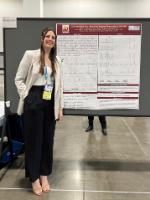Loyola University Chicago
Forensic Science Program
The Forensic Science Program is proud to be FEPAC accredited through 2027!
FEPAC, or Forensic Science Education Accreditation Commission, is a nationally recognized accreditation body specific to forensic science education. FEPAC sets national standards related to forensic science education and evaluates programs according to these standards. These include, but are not limited to, curriculum requirements (natural sciences and forensic sciences), faculty, institutional support, assessment of student performance, and involvement with forensic science laboratories & organizations. Programs must submit an application (self-study) and undergo an onsite visit. Accreditation is valid for five years, provided the programs continue to meet the requirements and provide appropriate documentation.
The Forensic Science Program at Loyola completed the self-study and on-site assessment last year and was awarded re-accreditation in the spring of 2022.
Undergraduate Research in Forensic Science Presented at AAFS National Conference
Forensic Science major Kristina Martinet presented her research on the analysis of terpenes and terpenoids at the American Academy of Forensic Sciences (AAFS) Conference last month in Denver. These compounds are believed to have medicinal benefits and are responsible for the aroma characteristics in plants, including hops and cannabis. In Dr. DeFrancesco’s lab, she worked to develop an optimized method for separation and identification using Gas Chromatography-Electron Impact-Mass Spectrometry (GC-IE-MS). After graduation in May 2024, Kristina will start her new job in forensic toxicology at the Wisconsin State Laboratory of Hygiene. Funding for her travel to AAFS was graciously provided by the Forensic Science Program and the Chicago Chromatography Discussion Group.
See the CAS Student Spotlight for more information on Kristina's accomplishment.

Conference proceedings will be available soon at: https://www.aafs.org/resources/annual-conference-proceedings
Partnerships and Publications
Dr. James DeFrancesco has a new publication out from a collaboration with Dr. Paul Chiarelli (Department of Chemistry) and the Dental School at the University of Illinois Chicago. Dr. DeFrancesco's expertise in analytical chemistry allowed the analysis of metabolites of pyrene and phenanthrene in this study
You can read the article here.
Tao L, Chiarelli MP, Pavlova S, Kolokythas A, Schwartz J, DeFrancesco J, Salameh B, Green SJ, Adami G. 2024. Enrichment of polycyclic aromatic hydrocarbon metabolizing microorganisms on the oral mucosa of tobacco users. PeerJ 12:e16626 http://doi.org/10.7717/peerj.16626
Forensic Analysis of Drugs: How Controlled Substances Became What They Are Today
Dr. DeFrancesco spoke with Richard Jacobs on the Finding Genius Podcast about forensic analysis of drugs. Dr. DeFrancesco shared his expertise on opioids, clandestine labs, drug trends, and more. Listen using the links below or search for episode Forensic Analysis of Drugs: How Controlled Substances Became What They Are Today on Finding Genius Podcast. (Air date: Nov 21, 2023)
Amazon Music | Apple Podcasts (iTunes) | Audible | Castbox
Finding Genius Website | Google Podcasts | I Heart Radio
Podcast Addict | Spotify | Pandora | YouTube
Forensic Science Faculty in the News
Touch DNA is a concept that has been around for over a decade in forensic DNA casework – but what does it really mean? Our local FOX 32 station wanted to know, and interviewed FS faculty member Wendy Gruhl to get answers.
American Academy of Forensic Sciences 2023
In February, FS Faculty had a busy and productive week at the American Academy of Forensic Science 75th annual meeting.
Dr. DeFrancesco presented collaborative research, conducted with Mary T. McMillin (FS Program alum), Matthew Reichert, PhD (former LUC Chemistry faculty), and Majid Asfar, MD (former LUC Stritch School of Medicine faculty).
Dr. Negrusz served on the Toxicology Working Group of the on AAFS – ASB (Academy Standards Board).
Dr. DeFrancesco and Ms. Gruhl participated in sessions from FEPAC (Forensic Science Education Programs Accreditation Commission) and COFSE (Council of Forensic Science Educators).



